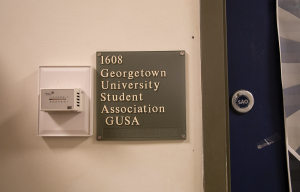
The club funding referendum in December received enough votes to pass, but was invalidated in January.
Last December’s Georgetown University Student Association club funding referendum, which was later invalidated, would have been approved by more than a two-third margin, according to the results released by the Election Commission early Friday morning.
The results were voided by the GUSA Constitutional Council Jan. 20 on the grounds that the GUSA senate violated GUSA bylaws by failing to present the details of the referendum to the student body within 14 days of the vote.
The referendum, which would have replaced the senate with a proposed assembly, passed with 69 percent in support of club funding reform and 31 percent against, with a 37 percent turnout. The referendum received support from 25.5 percent of the total undergraduate student body, just over the 25 percent necessary to pass. However, the results remain null and void, and were released only for informational purposes.
The petitioners in the original case argued that supporters of the referendum within GUSA mounted an electioneering campaign to influence votes and failed to inform students according to the constitutionally mandated timeline.
“While to some people it might seem like a technicality, to me and some other people I’ve talked to, it’s just emblematic of this greater problem of unintentionally misinforming students and not giving them the opportunity to be most informed that they could be before voting,” Jasmin Ouseph ’19, who filed the appeal, said.
The constitutional council rejected the petitioners’ electioneering complaints but ruled in their favor that the referendum was not presented to students in a timely way as required by GUSA bylaws. The council declared the results null and void, and prohibited the election commission from revealing the results to any other members of GUSA or the public.
However, GUSA senators Scott Lowder (COL’17) and Owen Hayes (SFS ’18), chair and vice chair of the Finance and Appropriations Committee of GUSA, filed an appeal to overturn the original opinion. In its second opinion released Feb. 18, the council upheld the decision to invalidate the results, but also overturned their earlier order prohibiting the release of the results.
“This council withheld the release of the December 1st Constitutional Referendum Vote based on a balancing of competing interests: those of the public’s right of transparency, against the potential that the results could bias a second referendum vote,” the second opinion reads. “The potential for bias, which is small and practically eliminated given the Council’s final order, is outweighed by the demonstrative call for transparency.”
In a tweet shortly after the second council opinion was released, the election commission announced it would release the results of the nullified referendum Friday morning, along with the results of Thursday’s executive election.
Lowder maintained that the results should not have been invalidated, but said he approved of the decision allowing the results to be released.
“If the results are released on Thursday, and it shows that it would’ve been approved had it not been invalidated, that puts a mandate on either this session of the senate or the next GUSA executive to present this again to the student body because it shows a desire for club funding reform and restructuring going forward,” Lowder said.
Ouseph, who opposed the referendum, expressed concern that the release of results would do exactly that.
“I’m worried that GUSA might use that to push a second referendum onto the student body or get this restructuring club funding reform package passages again,” Ouseph said.
GUSA senate speaker Richie Mullaney (COL ‘18) said the lengthy course of the referendum points to larger problems in GUSA’s structure.
“The fact that this saga took 85 days to complete proves there are structural problems in GUSA that need to be addressed. Long processes that aren’t transparent like these are exactly what alienates students from GUSA,” Mullaney wrote in an email to The Hoya. “I’m glad that we finally get to see the results because students deserve that transparency.
The electioneering case was filed by GUSA senators Jasmin Ouseph (SFS ’19), Isaac Liu (COL ’20) and Charles Hajjar (MSB ’20), GUSA Free Speech Policy Team chair D.J. Angelini (MSB ’17), GUSA Dining and Auxiliary Services Policy Team chair Mark Camilli (COL ’19) and Dylan Hughes (COL ’19), who is unaffiliated with GUSA.




















